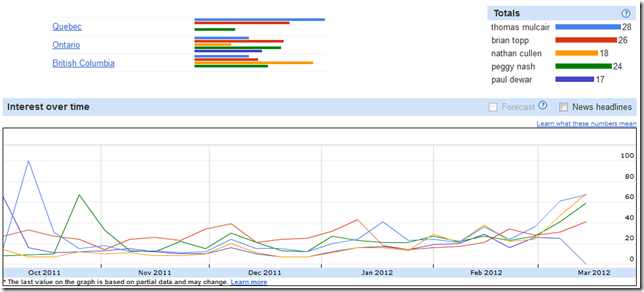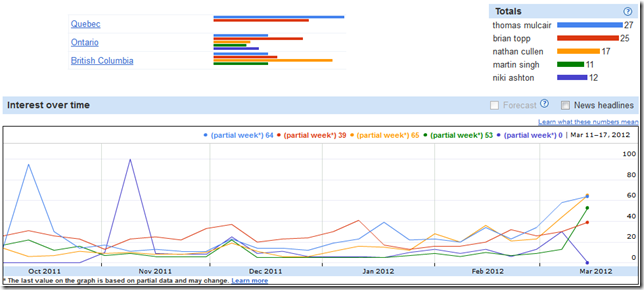Despite the random number of polls and media speculation, there’s really only one way to know who’s doing the best in a race like the NDP leadership race – the final ballot.
But until then we can make up all kinds of metrics to see how well everyone is doing. For example, Google offers their search insights which lets you track how many people are searching for different terms. By comparing the leadership contenders over the course of the race, we can see who has momentum and is generating interest.
Unfortunately, the chart limits me to only 5 terms at a time, so you’ll have to view these results in two separate graphs.
First, the “frontrunners”: Thomas Mulcair, Brian Topp, Nathan Cullen, Peggy Nash, and Paul Dewar. [Click to enlarge]

Here we can see Mulcair’ leads the search results – primarily due to a large bump back in October. We see that he and Nathan Cullen are in a tight race for first, with Cullen just overtaking Mulcair in the last week. Peggy Nash isn’t far behind and Brian Topp seems to have maintained a consistent interest, albeit lower than when he lead from November until mid-January. Finally, after a low-searched campaign, Dewar has fallen off the chart.
Google allows us to further break these results down by region (see inset). These show that Mulcair holds a lead in Quebec, while Cullen has a strong lead in BC. In fact, Mulcair is fourth in BC, behind Cullen, Nash, and Topp. Dewar doesn’t appear in Quebec or BC, while Cullen doesn’t appear in Quebec.
To get the rest of the competitors, I’m going to replace Paul Dewar and Peggy Nash with Niki Ashton and Martin Singh for comparison, keeping as many colours constant as possible.

Here we see a big jump for Niki Ashton when she launched her campaign in November, followed by a fairly quiet campaign until early March before it crashed. By raw numbers, Niki Ashton is only slightly behind Paul Dewar and Martin Singh is trailing very close behind. What’s potentially more interesting is Martin Singh’s late jump ahead of Brian Topp in at the end. Directly comparing the numbers, he still falls just behind Peggy Nash. Singh’s jump is likely related to recent allegations of a pact between him and Mulcair.
In the regional data we can see neither candidate gets a hit in Quebec, and Singh is tied in BC with Mulcair. Ahston pulls ahead of Nathan Cullen in Ontario.
Unfortunately, our country is still too sparsely populated for Google to give us much deeper information (like the other provinces). Furthermore this represents search terms, which can be conducted by anyone. This doesn’t necessarily mean NDP members are searching for these people, although it’s likely a safe bet that more NDP members are searching for the leadership candidates than anyone else.
I’ve only included clips of the automatically generated graphs here, but you can follow the links above to the searches and play around with the parameters yourself or download the spreadsheet file.

